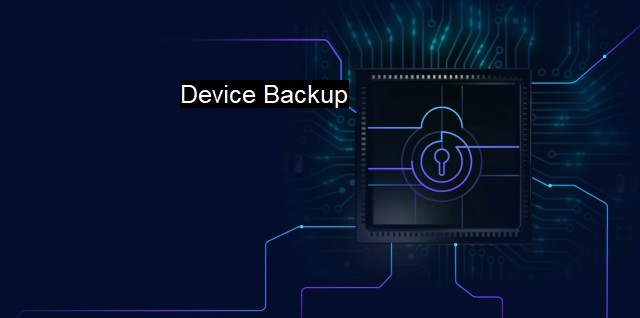What is Device Backup?
The Importance of Device Backup for Cybersecurity and Antivirus: Safeguarding Your Device Data from Cyber Threats and Attacks
Device backup refers to the process of duplicating and storing data from computer systems and devices to secure a secondary copy. It is a safeguarding measure to protect and ensure the availability of data and systems critical to both individuals and businesses. The context of a device backup in cybersecurity and antivirus practices remains clear and significantly important, as it helps to mitigate the threats, liability and damages associated with data loss.There are primarily three main types of device backups: full, differential, and incremental backups. A full backup marks all files and folders for duplication and storage. A differential backup only marks files that have changed since the last full backup. An incremental backup, on the other hand, merely discriminates and backs up files that have been modified since the last backup session of any kind. The backups serve distinct purposes, but all hold the same common goal of saving and protecting relevant data.
Cybersecurity signifies the body of technologies, processes, and practices designed to shield networks, devices, programs, and data from attack, damage, or unauthorized access and data larceny. Device backup plays an essential role in cybersecurity. Often users lose data due to cybercrimes such as malware, ransomware and phishing attacks etc., or due to device damages or mishaps like software corruption or hardware failure. Such circumstances can lead to massive data loss. Having device backup in place can help to restore the lost information and reduce potential data breaches.
Antivirus protection, on the other hand, is software designed to detect and destroy computer viruses. They are put into place to safeguard a computer system's data against malware attacks that can affect system performance, steal sensitive information, or cause loss of data. In such incidents too, a device backup can expediently restore the lost or corrupted data, ensuring business continuity.
Data is often the lifeblood of an individual user or a business. It may include personal information, favorite photographs, critical business documents, and more. If unprotected, this information becomes vulnerable to threats. Regular device backups are an integral part of any effective cybersecurity strategy as it shields the user from the potentially catastrophic effects of data loss.
A proactive approach in the form of the scheduled device backup, along with antivirus software, can create a more protective environment. Multiple tiers of security controls known as “defense in depth” including the antivirus software, firewall, strong and unique passwords and encrypted data combined with device backups, help prevent any catastrophic loss of information, time or money that data larceny or loss can cause.
Backup and restoration mechanisms also need a level of security. It's important to ensure the integrity of data backups by safeguarding them with encryption in transit and at rest. Encrypted backups are more secure and harder for cyber-attackers to utilize, making the data less appealing.
The practice of device backup both in the cloud and on physical storage devices is advisable for maximum security. Users should also not neglect to update their devices as updates frequently contain security patches for new vulnerabilities.
To sum up, in the context of cybersecurity and antivirus practices, a device backup is not just a safety net in the instance of data loss, but an active tool to protect, prevent, and recover from the ever-evolving array of cyber threats. When incorporated into routine practices, device backup is a robust strategic measure to ensure long-term data security.

Device Backup FAQs
What is device backup and why is it important in cybersecurity?
Device backup is the process of creating a copy of all the data and files stored on a device, such as a computer or mobile phone. It is important in cybersecurity because in case of a malware attack or other security breach, having a backup of your important files and data can help you recover quickly without losing any valuable information.How often should I backup my device to ensure maximum protection against cyber threats?
It is recommended that you backup your device at least once a week to ensure maximum protection against cyber threats. However, if you frequently create new files or update existing ones, you may want to backup your device more frequently.What are some common methods for backing up my device?
There are several methods for backing up your device, including using an external hard drive, cloud storage services, and backup software. External hard drives are ideal if you want to keep your data offline, while cloud storage services allow you to access your data from anywhere with an internet connection. Backup software, such as antivirus programs, can also automatically backup your files and protect your device from cyber threats.How can I ensure that my device backup is secure?
To ensure that your device backup is secure, it is important to use a strong and unique password for your backup files. You should also encrypt your backup files and store them in a secure location, such as a fireproof safe. Additionally, you can use antivirus software to scan your backup files for malware and other security threats.| | A | | | B | | | C | | | D | | | E | | | F | | | G | | | H | | | I | | | J | | | K | | | L | | | M | |
| | N | | | O | | | P | | | Q | | | R | | | S | | | T | | | U | | | V | | | W | | | X | | | Y | | | Z | |
| | 1 | | | 2 | | | 3 | | | 4 | | | 7 | | | 8 | | |||||||